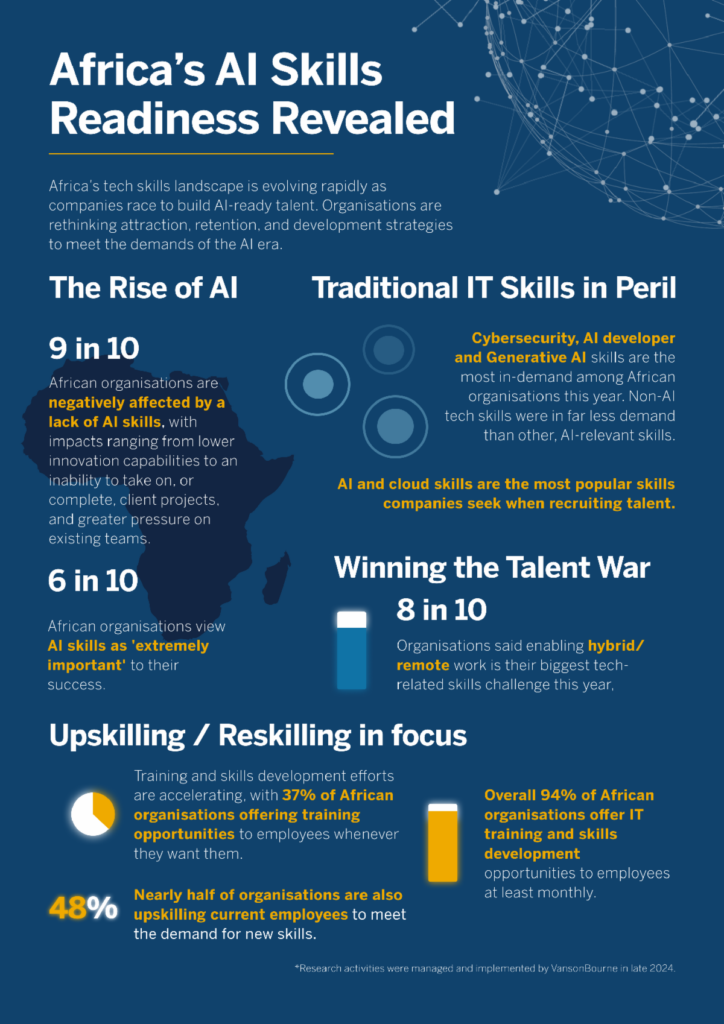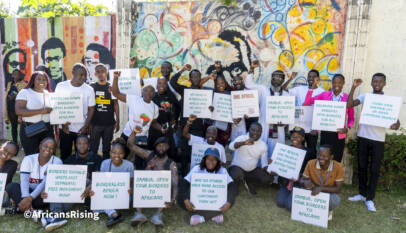Africa’s AI skills landscape revealed in new SAP report

JOHANNESBURG, South Africa, 15th May 2025-/African Media Agency(AMA)/- SAP today released a new report, ‘Africa’s AI Skills Readiness Revealed’, which provides research into how African companies are transforming their skills development efforts to meet the demands of the Age of Artificial Intelligence.
Nazia Pillay, Interim Managing Director for South Africa at SAP, says: “The data is clear: African companies expect the demand for AI skills to increase this year, with six in ten saying AI skills are ‘extremely important’ to their success. The business impact of a lack of AI skills availability is already evident, with 90% of companies in our research citing negative impacts that include project delays, failed innovation initiatives, and an inability to take on new work.”
SAP’s latest report follows an earlier tech skills report released in 2023 which unveiled specific challenges and opportunities for African organisations seeking greater tech skills availability.
“Our first report was conducted just as we exited the worst of the pandemic impact. At the time, companies were facing several challenges with attracting, retaining and upskilling suitable qualified tech workers, especially in the wake of the rise of remote and hybrid work environments. This year, the business landscape has been transformed by the impact of AI technologies and the search for relevant skills.”
The research was conducted at the end of 2024 among both mid-size and enterprise-level companies in Kenya, Nigeria and South Africa.

Universal need for AI skills
Every organisation that was surveyed as part of the research said they expect the demand for AI skills to increase in 2025. All companies also expected to experience some AI-related skills gap this year. “Skills related to AI are hugely in-demand among African organisations, with 85% saying AI development skills are a priority, and 83% prioritising Generative AI skills. To help close the AI skills gap, two-thirds of organisations are introducing career development initiatives with AI specialisation to upskill or reskill employees.”
Overall, the most in-demand tech skill among African organisations is cybersecurity. “Eighty-six percent of companies said cybersecurity skills were important to them, a significant increase over the 63% that said the same in our previous research. The growing importance of cybersecurity may be partly explained by the rapid growth of Africa’s digital economy and the millions of citizens that are being brought into the digital fold through public and private sector initiatives.”
Changing workplace expectations
There are far-reaching changes in the expectations of both employers and employees regarding skills and the workplace compared to a few years ago. “Eight in ten African organisations said supporting skilled employees’ requests for hybrid or remote work is their top skills-related challenge this year, a significant increase from only 32% who said the same in our previous survey.?
The non-technical attributes that African organisations look for in potential hires have also evolved. “In 2023, technical skills and industry-specific skills were the top attributes. Affordability was somewhere near the bottom, with less than a third of organisations saying they consider it during the hiring process. This year, affordability is the number one candidate attribute for African organisations, with adaptability a close second.”
Adaptability is essential in light of the need for employees to be upskilled or reskilled with AI skills. “Reskilling is a top skills-related priority for 38% of companies this year, with 48% saying the same of upskilling employees. Unsurprisingly, two-thirds of companies said helping employees understand why reskilling is necessary is one of the top challenges this year.”
Training, skills development in the spotlight
Pillay says companies are stepping up their IT training and skills development efforts to help meet the demand for skills. “Ninety-four percent of African organisations offer training and skills development to employees at least monthly, an increase from 74% in our last survey. The number of companies offering training opportunities to employees at any time also increased from 28% in our last survey to 37% this year.”
Surprisingly, the portion of companies’ IT or HR budgets allocated to skills-related initiatives has declined since 2023. “The drop in budget allocation for skills development requires an urgent rethink. Organisations that don’t invest in appropriate skills now may find they are unable to leverage new innovations and emerging technologies, leaving them trailing their more skills-enable competitors.”
SAP’s ‘Africa’s AI Skills Readiness Revealed’ report is now available and can be downloaded here.
Distributed by African Media Agency (AMA) on behalf of SAP Africa.
Visit the SAP News Center. Follow SAP at @SAPNews.
About SAP
As a global leader in enterprise applications and business AI, SAP (NYSE:SAP) stands at the nexus of business and technology. For over 50 years, organizations have trusted SAP to bring out their best by uniting business-critical operations spanning finance, procurement, HR, supply chain, and customer experience. For more information, visit www.sap.com.
Note to editors:
To preview and download broadcast-standard stock footage and press photos digitally, please visit www.sap.com/photos. On this platform, you can find high resolution material for your media channels.
For customers interested in learning more about SAP products:
Global Customer Center: +49 180 534-34-24
United States Only: 1 (800) 872-1SAP (1-800-872-1727)
For more information, press only:
James Wilson, Head of Communications Africa – SAP james.wilson03@sap.com
Palesa Mokitle p.mokitle@bdcomms.co.za
Please consider our privacy policy. If you received this press release in your e-mail and you wish to unsubscribe to our mailing list please contact press@sap.com and write Unsubscribe in the subject line.
The post Africa’s AI skills landscape revealed in new SAP report appeared first on African Media Agency.















